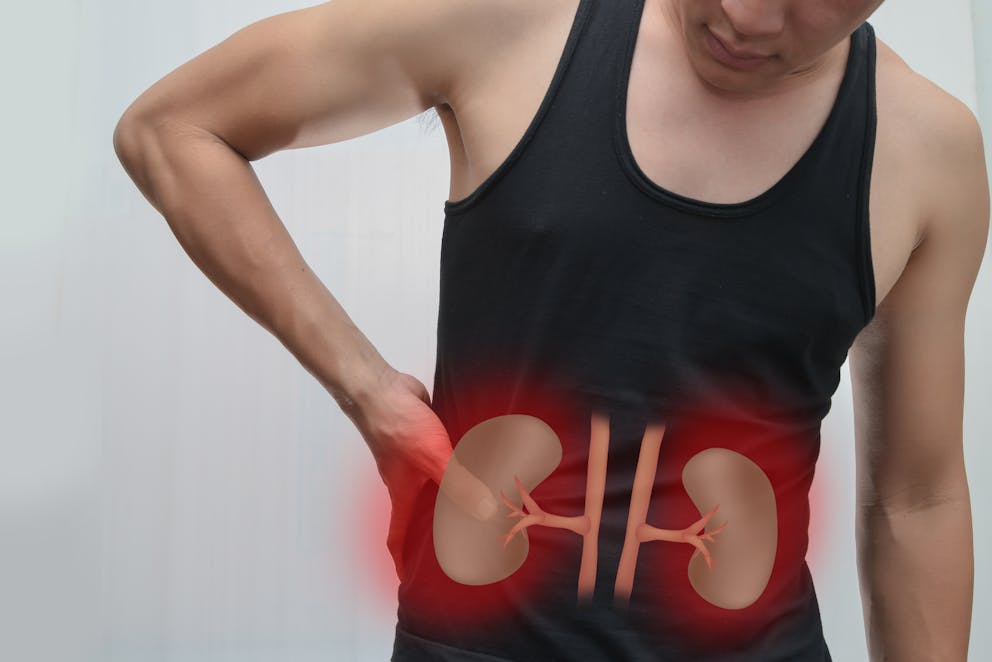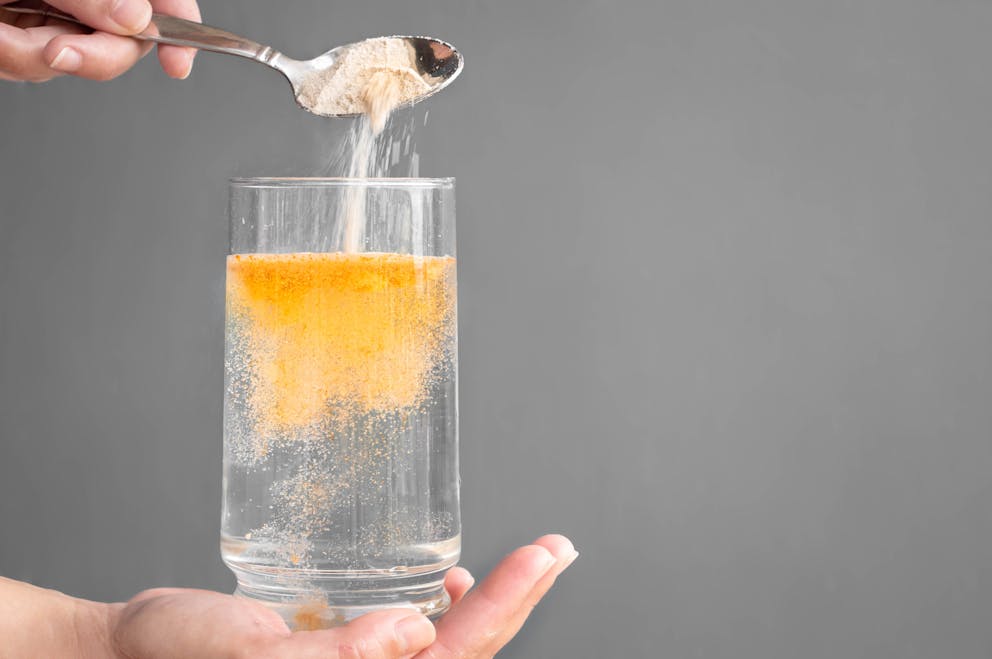Overhydration: Causes, Symptoms, and Prevention
Overhydration, also known as water intoxication, is a result of excessive water intake and can lead to the dilution of electrolytes in the body.
Electrolyte imbalances can have serious health consequences and, in severe cases, can even result in coma and death.
Let’s explore some common causes of overhydration and discover how you can keep hydrated without the risk of electrolyte imbalances.

What is overhydration?
Overhydration, or water intoxication, occurs when fluid intake surpasses the kidneys' ability to excrete excessive body fluids.
The kidneys play an important role in maintaining the body’s fluid balance. If the kidneys sense dehydration, water is reabsorbed, resulting in concentrated urine. In contrast, elevated fluid levels trigger increased urine production and more diluted urine.
However, excessive water intake can overwhelm the kidney’s ability to maintain normal fluid balance, which increases the risk of water intoxication.
A study published in Annals of Pediatric Endocrinology & Metabolism found that excess water intake can dilute the concentration of electrolytes, particularly sodium, in the bloodstream.
Severe reduction of sodium concentrations in the body can lead to hyponatremia, a potentially serious condition that impacts various critical physiological functions.
Sodium plays a crucial role in maintaining proper fluid balance in cells and tissues, and hyponatremia can trigger cellular water retention, leading to the swelling of cells.
“Brain cells are especially sensitive to sodium, and overhydration can result in brain swelling, which is associated with various neurological symptoms and, in severe cases, can lead to coma and even death,” explains Dr. Berg.
Watch the video below to discover some of the biggest mistakes when drinking water.
3 Causes of overhydration
While excessive water intake is the leading cause of overhydration, other factors can increase the risk of imbalanced fluid regulation and overhydration.
Here are three common causes of water intoxication.
1. Certain medications
Some medications, particularly antipsychotic drugs and diuretics, can contribute to water intoxication.
Antipsychotic drugs may cause psychogenic polydipsia, which is characterized by excessive thirst driven by psychological factors, prompting individuals to consume large quantities of water.
Research published in the Shanghai Archives of Psychiatry suggests that excessive intake of water may be a compulsive response to the anticholinergic side effects of psychotropic medications, potentially leading to overhydration.
Diuretics, often referred to as water pills, may also cause symptoms of overhydration, although primarily related to loss of sodium rather than the retention of excessive body fluids.
Changes in the body’s electrolyte balance can trigger thirst, which explains why medication that impacts electrolyte levels can increase the risk of overhydration.
2. Prolonged physical activity
Prolonged and intense physical activity, especially in extreme heat or humidity, can lead to a significant loss of electrolytes, and rehydrating with excessive amounts of water without replenishing electrolytes is a common cause of overhydration.
Lack of adequate electrolytes in combination with high fluid intake can impair the normal function of the central nervous system and lead to health issues, including elevated heart rate, muscle cramps, confusion, and seizures.

3. Medical conditions
Underlying medical issues, including hormonal imbalances and poor kidney function, can affect fluid regulation and increase the risk of water toxicity.
According to MedlinePlus, individuals diagnosed with the syndrome of inappropriate antidiuretic hormone secretion (SIADH) produce an excessive amount of antidiuretic hormone (ADH).
ADH regulates kidney function and water loss through urine. However, SIADH disrupts the body’s fluid balance and can lead to water retention and hyponatremia.
In addition, kidney failure can cause water intoxication due to the kidneys' compromised ability to regulate fluid balance and eliminate excess water from the body.
As the kidneys lose efficiency, fluid accumulates, leading to excess blood volume, elevated blood pressure, and potential overhydration.

Symptoms and diagnosis of overhydration
Fluid and electrolyte imbalances negatively impact critical cellular functions and can manifest in various signs and symptoms.
Here are common symptoms associated with overhydration:
Muscle cramps
Clear or colorless urine
Nausea
Confusion
Weakness
Fatigue
While mild overhydration can typically be managed without the need for medical attention, severe water intoxication can lead to brain swelling, respiratory distress, coma, and even death.
It’s crucial to consult a healthcare provider immediately if you have consumed excessive amounts of fluid or show signs of water toxicity.
Medical professionals can assess urine color and perform blood tests to evaluate electrolyte concentrations, particularly sodium levels, to check for possible hyponatremia.
In addition, urine tests can help establish electrolyte excretion, which provides insights into the body's fluid balance and hydration status.

Overhydration risk factors
While water toxicity is rare, several factors can increase the risk of excessive fluid accumulation and electrolyte imbalances linked to overhydration.
Here are common overhydration risk factors:
Hot and humid climate
Endurance training
Low body weight
Inadequate electrolyte intake
Certain prescription medications, including antipsychotic drugs and diuretics
Underlying hormone imbalances
Kidney problems

How to prevent overhydration
To prevent overhydration, it's crucial to avoid excessive fluid intake and maintain adequate electrolyte levels.
Potassium is the most important electrolyte that counteracts the water-retaining properties of sodium, which plays a crucial role in maintaining the body’s fluid balance.
Potassium is found in green leafy vegetables, avocado, pumpkin seeds, salmon, and dairy products. Unfortunately, many people don’t consume enough potassium-rich foods to maintain adequate levels, leaving them at increased risk of fluid imbalances and water retention.
Furthermore, individuals with underlying health conditions, such as kidney disorders or hormonal imbalances, should work closely with healthcare professionals to manage their fluid levels.
How much water should you drink?
The notion that the body requires eight glasses of water daily is a common myth.
Individual hydration needs vary based on age, weight, climate, and physical activity levels, and listening to your body and monitoring your thirst are the most effective ways to stay hydrated while avoiding excessive fluid intake.
While water is one of the best fluids to maintain optimal hydration, plain water doesn’t contain electrolytes, which explains why you can be dehydrated despite drinking a lot of water.
Adding electrolytes to your daily routine is an excellent strategy to promote balanced fluid levels and helps prevent both overhydration and dehydration.
However, it’s best to avoid pre-mixed sports drinks that often are packed with sugar and caffeine and instead opt for a sugar-free electrolyte powder.

What to do if you become overhydrated
Mild cases of overhydration can generally be managed by reducing fluid intake to allow the body to eliminate excess water naturally. This may take several hours or even days, depending on the severity of fluid accumulation in the body.
Electrolyte replacement is crucial, as overhydration dilutes vital minerals, including sodium and potassium.
Consider consuming potassium-rich foods or opt for an electrolyte powder to replenish lost electrolytes and restore the body’s fluid balance.
When to see a doctor
If you experience symptoms of acute water toxicity, such as confusion, vomiting, or difficulty breathing, it is crucial to seek immediate medical attention.
Additionally, sudden weight gain or swelling in the extremities can indicate a severe fluid imbalance that may require hospitalization for intravenous electrolyte administration.
Individuals with kidney problems and those taking antipsychotic medications are at increased risk of overhydration and should discuss any concerns they may have with a healthcare provider.

Key takeaways
Excessive water intake, known as overhydration, can result in electrolyte imbalances, which can lead to symptoms such as muscle spasms, weakness, and fatigue.
Avoiding excessive fluid intake and maintaining balanced sodium and potassium levels is crucial to prevent water intoxication, which can have serious health consequences and may, in severe cases, cause coma and even death.
FAQ
1. How do I know if I am overhydrated?
Overhydration can lead to symptoms such as nausea, headache, vomiting, gastrointestinal distension, swollen extremities, confusion, and clear or lightly colored urine.
2. What are the first signs of overhydration?
Early warning signs of overhydration include fatigue, muscle weakness, and swelling. As water toxicity progresses, neurological symptoms such as confusion and seizures can develop.
3. How do I fix overhydration?
Mild cases of overhydration can be managed by restricting fluid intake and replacing lost electrolytes, especially sodium and potassium.
However, severe cases of water toxicity require immediate medical attention to address electrolyte loss and excessive fluid levels.
4. How long does overhydration last?
While mild overhydration can typically be resolved within a few hours of restricting fluid intake, severe water toxicity may require several days of medical care and close monitoring.
5. Can water poisoning go away on its own?
Most mild cases of overhydration improve without the need for medical intervention. However, seeking immediate medical attention is crucial if you suspect water toxicity or show signs of severe overhydration.
6. How much water does it take to be overhydrated?
Your kidneys are responsible for producing around 2 liters of urine per day.
Therefore, it is best to avoid excessive water intake to ensure proper kidney function and prevent overhydration.
7. How much water should I drink each day?
Your daily fluid needs can vary depending on age, activity levels, and underlying medical issues.
It’s essential to listen to your body and drink water when thirsty rather than forcing excessive water intake to stay hydrated.
8. Is it safe to drink a gallon of water a day?
While drinking a gallon of water daily is generally considered safe for most adults, it’s crucial to replenish electrolytes to reduce the risk of overhydration.
9. Does salt fix overhydration?
Yes, consuming salt may help manage water intoxication by restoring sodium levels, which play a critical role in maintaining the body’s fluid balance.
However, severe cases of overhydration require medical intervention and intravenous electrolyte replacement therapy.
10. How serious is overhydration?
Drinking too much water can cause electrolyte imbalance and dilute the body’s sodium concentrations, also known as hyponatremia.
Severe cases of hyponatremia can have serious health consequences, including brain swelling, impaired central nervous system functions, coma, and even death.
Sources
Tags

Popular
08/21/2024
53.6K views
02/23/2025
45.4K views
11/18/2024
270.1K views
03/18/2024
11/21/2022




